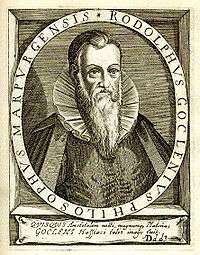Rudolph Goclenius

Rudolph Goclenius the Elder (Latin: Rudolphus Goclenius; born Rudolf Gockel or Göckel; 1 March 1547 – 8 June 1628) was a German scholastic philosopher who lived from March 1, 1547 to June 8, 1628. Gockel’s main contribution to science was his invention of the term “psychology” in 1590. Gockel also had extensive backing and significant contributions to the field of ontology. He extended on many ideas from Aristotle, such as both the introduction of ontology and metaphysics. Several of Gockel’s ideas were published and built upon by later philosophers. To this day, Gockel’s main contribution remains his terming of “psychology.”
Life
He was born in Korbach, Waldeck (now in Waldeck-Frankenberg, Hesse).
He attended the universities at the University of Erfurt, the University of Marburg and the University of Wittenberg, where he finished his studies with a M.A. in 1571. In the following years he directed the gymnasiums in his hometown Korbach and in Kassel. In 1581, Landgraf Wilhelm IV of Hesse-Kassel, who was a reputed astronomer, refused his wish to return to Korbach, but allowed him to be appointed professor at the Philipps University of Marburg, where he had the chairs of philosophy, logic, metaphysics and ethics. He served as a counsellor to Wilhelm and his son Moritz. The latter sent him 1618 to the Synod of Dort.
Although he dubbed the name of "psychology," his major contribution was to the field of Ontology. As a follower of Aristotle's work, Glöckel gave the philosophy a name and continued in Aristotle's way of thinking. The philosophical discipline of Ontology is thought to be developed in the 17th century by Glöckel.[1]
Glöckel died in Marburg in June 1628.
Family
His oldest son, Rudolph Goclenius the Younger, or Rudolf Goclenius, Jr. was professor in Marburg, and a celebrated mathematician. It is after Rudolph Goclenius, Jr., that the lunar crater is named. He also worked on cures against the plague. He became famous for his miraculous cure with the "weapon salve" or Powder of Sympathy.
Views
From his dispute with Wilhelm Adolph Scribonius of Marburg on the legality of the ordeal by water in witch trials, one can deduce that Goclenius was convinced on the existence of witchcraft and adhered to the "Hexenhammer".
His views reflected those of Aristotle. His philosophies belonged to a group called “Semiramists,” which was a group of Aristotelians who believed in advocating dialectic interpretation of Aristotle’s learning, but also advocating the exposition of averroism.[2]
Works
He was highly literate and wrote articles on many subjects, not only philosophy but also mathematics, geography, astrology (or astronomy), botanic, zoology, medicine. In his Lexicon philosophicum (1613) he used the term ontology coined by Jacob Lorhard in his Ogdooas Scholastica (1606).
Goclenius’ major contributions also included publications which led to the term “psychology.” His Lexicon Philosophicum, published in 1590, is the first printed book to contain the word “psychology.”
Goclenius' crowning achievement is his original contribution made to term logic, called the Goclenian Sorites. In the words of the British logician Carveth Read:
"It is the shining merit of Goclenius to have restored the Premises of the Sorites to the usual order of Fig. I.: whereby he has raised to himself a monument more durable than brass, and secured indeed the very cheapest immortality. How expensive, compared with this, was the method of the Ephesian incendiary!"[3]
In 1590, this German scholastic philosopher is often attributed for the initial use of the term "psychology" in his writing. "Yucologia hoc est de hominis perfectione, anima, ortu." This was a Latin dissertation that translates to English as, "that is from the perfection of Yucologia of man, the rising of the soul.[4]
Publications
- Problemata logica, pars I 1589, pars II 1590; Pars I-V 1594 (reprint: Frankfurt: Minerva, 1967, in 5 voll.)
- Psychologia: hoc est De hominis perfectione, animo et in primis ortu hujus, commentationes ac disputationes quorundam theologorum & philosophorum nostrae aetatis, Marburg 1594
- Oratio de natura sagarum in purgatione examinatione per Frigidam aquis innatantium, Marburg 1590.
- Partitio dialectica, Frankfurt 1595
- Isagoge in peripateticorum et scholasticorum primam philosopiam, quae dici consuevit metaphysica, 1598 (reprint: Hildesheim: Georg Olms, 1976)
- Institutionum logicarum de inventione liber unus, Marburg 1598
- P. Rami Dialectica cum praeceptorum explicationibus, Oberursel 1600
- Physicae completae speculum, Frankfurt 1604
- Dilucidationes canonum philosophicorum, Lich 1604
- Controversia logicae et philosophiae, ad praxin logicam directae, quibus praemissa sunt theoremata seu praecepta logica, Marburg 1604
- Conciliator philosophicus, 1609 (reprint: Hildesheim, Georg Olms, 1980)
- Lexicon philosophicum, quo tantam clave philosophiae fores aperiuntur, 1613 (reprint: Hildesheim: Georg Olms, 1980)
- Lexicon philosophicum Graecum, Marburg 1615 (reprint: Hildesheim: Georg Olms, 1980)
References
- ↑ Enskat, R. "Ontology." Religion Past and Present. Brill Online, 2013.
- ↑ Krstic, K. “The Author of the Term “Psychology”. Classics in the History of Psychology. 1964.
- ↑ C. Read, M.A., Logic, Deductive and Inductive, (Grant Richards, London: 1898), p. 119.
- ↑ DeCastro, D. “Psychogenesis of Psychology.” General Psychology. 2009
Further reading
- Diana Kremer, "Von erkundigung und Prob der Zauberinnen durchs kalte Wasser". Wilhelm Adolph Scribonius aus Marburg und Rudolf Goclenius aus Korbach zur Rechtmäßigkeit der "Wasserprobe" im Rahmen der Hexenverfolgung, in: Geschichtsblätter für Waldeck, Bd. 84, 1996, pp. 141–168.
- Marco Lamanna, La nascita dell'ontologia nella metafisica di Rudolph Göckel (1547-1628), Hildesheim: Georg Olms, 2013.
- Rudolf Schmitz, Die Naturwissenschaften an der Philipps-Universität Marburg 1517-1927, Marburg 1978, p. 15ff.
- Friedrich Wilhelm Strieder, Grundlage zu einer hessischen Gelehrten und Schriftsteller Geschichte. Seit der Reformation bis auf gegenwärtige Zeiten, Bd. 4, Göttingen 1784, p. 428ff.
External links
- Notes on the development of Ontology from Suarez to Kant
- The Birth of Ontology. A selection of Ontologists from 1560 to 1770